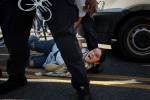Greatest story never confirmed is tale of great mensch-ness
Oddly, one of the most famous stories about the late Henri Lewin wasn’t included in his memoir, and his family declines to discuss it. World-famous boxer Max Schmeling didn’t include it in his memoirs either.
Yet it’s the stuff of heroic legends — a German boxer saving the lives of two Jewish brothers, Henri and Werner Lewin, who grew up to be famous hotel operators.
Henri Lewin was a Las Vegas legend during the years he ran the Hilton properties in Nevada from 1972 to 1985. A first-rate raconteur, he was known for his skills at running a hotel, his playful sense of humor, his vision and his demand for excellence.
In his 1990 memoir, “Be a Mensch,” Lewin described his life in Germany, his family’s escape to Shanghai and, finally, his hotel career in San Francisco and Las Vegas.
But his autobiography doesn’t tell about how Schmeling protected Werner and Henri when Nazis unleashed pogroms against German Jews on Nov. 9, 1938, what became known as Kristallnacht, or “Night of Broken Glass.”
A tale about being saved by Schmeling — who in 1936 was the first boxer to defeat Joe Louis only to be defeated by Louis two years later in a fight portrayed as the Good American versus the Evil Nazi — seems like one you’d mention in your memoir.
The first time the story saw print was in 1993, when two history professors published Henri Lewin’s account in “History Today.” It gained wider readership in 2001 when Frank Deford wrote a compelling profile of Schmeling for “Sports Illustrated.” Lewin also told the story to the Jewish News Weekly of Northern California in 2002.
After Lewin died April 16 at age 85, a friend recalled Deford’s riveting magazine article and shared it with me.
As the story goes, Schmeling bought his suits at Prince of Wales, the shop owned by Henri’s father, David Lewin. In November 1938, when German gangs began roaming the streets, David Lewin sent his two sons, then 15 and 14, to Schmeling’s hotel to ask for his protection. Schmeling hid the boys for two days in his hotel rooms. “He risked everything for us,” Lewin told the magazine.
As part of his analysis of how the German boxer balanced his friendship with Jews with his uneasy relationship with Adolf Hitler, Deford wrote that when Louis died in 1981, Schmeling asked Lewin to go to the funeral with cash for his widow.
“The German Jewish boy whom Schmeling had saved was now a rich American carrying a present to the family of the black man who, by thrashing Schmeling years before, had saved him the injustice of any longer being the Fatherland’s pride and joy,” Deford wrote.
Lewin said the first time he told the story publicly was in 1989 in Las Vegas, when Schmeling was being honored.
Yet Lewin’s book, written in 1989, doesn’t mention it.
The book tells of taking the money to Mrs. Louis in a footnote, and he describes Kristallnacht, but his rescue by Schmeling wasn’t there, which didn’t make sense. If you talk about it, why not write about it?
His oldest son, Larry Lewin, explained Friday that the incident was “something my father felt was very personal.” He said the family knows the facts, but one of his father’s wishes at the end was that they not talk about this. Lewin “lived through the Holocaust, and my father had this personal relationship with Max, and it was just an agreement they made between each other,” Larry Lewin said.
University of Rhode Island professor Robert Weisbord, co-author of the “History Today” article, said Friday that when he interviewed Henri, Werner declined to be interviewed. “I assumed it was true, and I think it was true. I can’t imagine why Henri Lewin didn’t put it in his book,” Weisbord said. He did note that Schmeling, who died in 2005, didn’t include it in his memoirs.
Perhaps these two epic figures had their reasons for not writing about the boxer’s protection of two Jewish boys at personal risk.
Setting doubts aside, I want to believe it’s true because it was the righteous thing to do. And it will live on as absolute truth … through the Internet.
Jane Ann Morrison’s column appears Monday, Thursday and Saturday. E-mail her at Jane@reviewjournal.com or call (702) 383-0275.


















